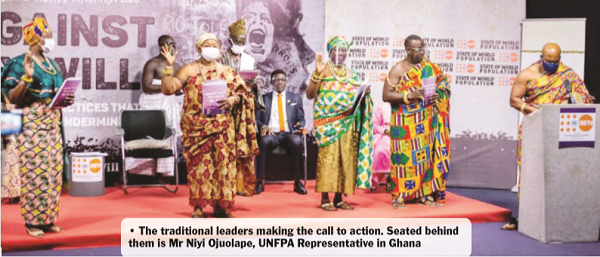
Traditional leaders commit to end harmful traditional practices
Traditional leaders in the country have affirmed their commitment to work towards ending all forms of harmful practices that are largely perpetrated against women and girls.
Acknowledging that the harmful practices have been driven by culture and religion, the traditional leaders said they had the responsibility to protect and promote the dignity and human rights of all people in their communities.
“We cannot overlook the fact that our communities still face many critical challenges. Too many women and girls are still faced with Female Genital Mutilation (FGM) and have to deal with the negative health, social and economic implications associated with the practice, others still suffer from child marriage and the practice of male preferences at birth which is still rife but in the most subtle ways in our culture and traditions,” the traditional leaders said.
Call to action
In a call to action at the launch of this year’s State of the World Population (SWOP) Report, representative of the traditional leaders said, “when these injustices occur in the name of culture and tradition, we are indeed aggrieved and very much challenged to respond in a manner that ensures change.”
“Not in our name should girls be traded for marriage, not in our name should any woman or girl be subjected to mutilation, not in our name should females be sacrificed for the preference of sons and men. Not in our name should any person be denied their human rights.”
The traditional leaders who attended the function were, Nana Atakora Bonsre Afriyie, Kronkohene of Kokofu, Bo-Naa Prof. Yakubu Nantogma, Chief of Bogu
and Member of the Council of State, Naa Koteitso Afrasomanso I, queenmother of Asere Koteiman and acting Ga Manye, Pognaba Veronica Abugrago, Paramount Queenmother of the Bawku traditional area, Mama Atrato, queenmother of Ho Dome and Nana Ansah Kwao IV, Chief of Akwamu Adumasa.
SWOP report
The 2020 State of World Population Report, which was launched globally under the auspices of the United Population Fund (UNFPA) had the theme ‘Against My Will: Defying The Practices That Harm Women and Girls and Undermine Equality.
In an overview of the report, the Deputy Representative of UNFPA, Ghana, Dr Agnes Ntibanyurwa, said the effects of the COVID-19 pandemic compounded the challenges of harmful practices against women and girls that “we have spent many years tackling.”
She observed that girls have had to drop out of school so that the boys who impregnated them could continue, against their will, adolescent mothers had been turned away from spaces they could seek help and counsel because they had been tagged promiscuous and unchaste, against their will girls and young women have had to run away from homes, friends and schools because they could no longer endure the cultural practices that only left physical, mental and emotional scars.
“In Ghana, UNFPA in partnership with government, UN sister agencies, religious and traditional leaders, civil society and youth networks are taking appropriate precautions to ensure that the needs of women and girls, including their health and well-being, are not clouded by an absolute focus on managing the COVID-19 pandemic,” Dr Ntibanyurwa stated.
Evidential information
In her remarks, the Executive Director of the National Population Council, Dr Leticia Appiah, said the report provided evidential information of the population to inform global and national programming and interventions.
She said although the government had initiated several interventions to strengthen child protection in the country, more needed to be done to completely eradicate those harmful practices and neglect for girls.
The chief of Adumasa, Nana Ansah Kwao IV, said women and girls were the forebear of life all over the world, they held the greatest responsibilities and yet also faced some of the harshest injustices and practices, including FGM , child marriage and unsafe maternal health practices all of which impacted the health of the population.
“As a traditional leader, I want to be a leader of change and stand up against all practices that harm women and girls.” he added.
